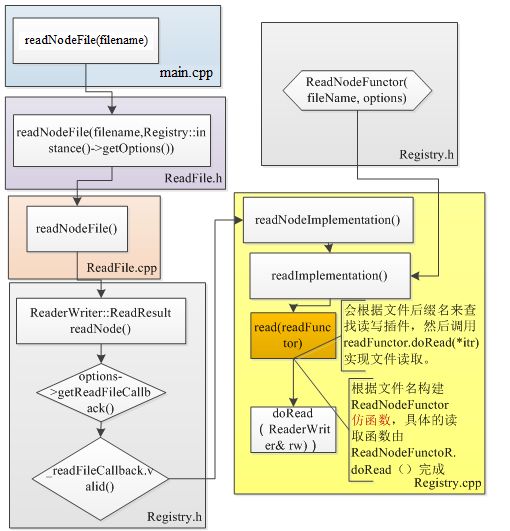【OSG】osgearthviewer读取earth文件,代码解析(earth文件读取的一帧)
转载:[原][osgearth]osgearthviewer读取earth文件,代码解析(earth文件读取的一帧)
跑osgearthviewer程序
使用一个earth文件做参数传入
跟进代码。
首先osgearthviewer程序加载earth的方式分为两种:
1.根据earth文件(load方式)
2.使用SDK加载(create方式)
我们使用earth文件是load方式,直接看load函数,定位到这个位置
// load an earth file, and support all or our example command-line options
// and earth file tags
osg::Node* node = MapNodeHelper().load(arguments, &viewer);
上面的函数是用来加载earth文件的,仔细看一下这个函数
发现这个函数是通过osgDB的加载机制来实现earth文件的加载。
下面我们先要搞清楚的是osgDB的加载机制
这是osgDB读取的调用顺序
回到,我们自己的程序,我将代码调试过程截图:
这里有不少默认的属性,而我们是定位到自定义的部分:(下图)
因为,我只用了一个传入参数,所以,这个循环只执行一次,就是调用了一次readRefNodeFile文件
这个函数好像是管理缓存什么的,我们在函数里定位到这里:(下图)
这个read才是开始真正解析数据了。
![]()
1 ReaderWriter::ReadResult Registry::read(const ReadFunctor& readFunctor)
2 {
......关于osga和zip文件的
52 // first attempt to load the file from existing ReaderWriter's第一次尝试从现有ReaderWriter的加载文件
53 AvailableReaderWriterIterator itr(_rwList, _pluginMutex);
54 for(;itr.valid();++itr)
55 {
56 ReaderWriter::ReadResult rr = readFunctor.doRead(*itr);
57 if (readFunctor.isValid(rr))
58 return rr;
59 else results.push_back(rr);
60 }
61
62 // check loaded archives.检查加载的档案
63 AvailableArchiveIterator aaitr(_archiveCache, _archiveCacheMutex);
64 for(;aaitr.valid();++aaitr)
65 {
66 ReaderWriter::ReadResult rr = readFunctor.doRead(*aaitr);
67 if (readFunctor.isValid(rr))
68 return rr;
69 else
70 {
71 // don't pass on FILE_NOT_FOUND results as we don't want to prevent non archive plugins that haven't been
72 // loaded yet from getting a chance to test for the presence of the file.
73 if (rr.status()!=ReaderWriter::ReadResult::FILE_NOT_FOUND) results.push_back(rr);
74 }
75 }
76
77 // now look for a plug-in to load the file.现在寻找一个插件加载文件!!!
78 std::string libraryName = createLibraryNameForFile(readFunctor._filename);
79 if (loadLibrary(libraryName)!=NOT_LOADED)
80 {
81 for(;itr.valid();++itr)
82 {
83 ReaderWriter::ReadResult rr = readFunctor.doRead(*itr);
84 if (readFunctor.isValid(rr))
85 return rr;
86 else results.push_back(rr);
87 }
88 }
89
90 //If the filename contains a server address and wasn't loaded by any of the plugins, try to find a plugin which supports the server
91 //protocol and supports wildcards. If not successfully use curl as a last fallback
92 if (containsServerAddress(readFunctor._filename))
93 {
94 ReaderWriter* rw = getReaderWriterForProtocolAndExtension(
95 osgDB::getServerProtocol(readFunctor._filename),
96 osgDB::getFileExtension(readFunctor._filename)
97 );
98
99 if (rw)
100 {
101 return readFunctor.doRead(*rw);
102 }
103 else
104 {
105 return ReaderWriter::ReadResult("Warning: Could not find the .curl plugin to read from server.");
106 }
107 }
108
109 if (results.empty())
110 {
111 return ReaderWriter::ReadResult("Warning: Could not find plugin to read objects from file \""+readFunctor._filename+"\".");
112 }
113
114 // sort the results so the most relevant (i.e. ERROR_IN_READING_FILE is more relevant than FILE_NOT_FOUND) results get placed at the end of the results list.
115 std::sort(results.begin(), results.end());
116 ReaderWriter::ReadResult result = results.back();
117
118 if (result.message().empty())
119 {
120 switch(result.status())
121 {
122 case(ReaderWriter::ReadResult::FILE_NOT_HANDLED): result.message() = "Warning: reading \""+readFunctor._filename+"\" not supported."; break;
123 case(ReaderWriter::ReadResult::FILE_NOT_FOUND): result.message() = "Warning: could not find file \""+readFunctor._filename+"\"."; break;
124 case(ReaderWriter::ReadResult::ERROR_IN_READING_FILE): result.message() = "Warning: Error in reading to \""+readFunctor._filename+"\"."; break;
125 default: break;
126 }
127 }
128
129 return result;
130 }
![]()
在第一次进入次函数时
它在78行 获取了插件叫osgDB_earth.dll(osgdb_earthd.dll)
它在第83行 开始加载插件调用了doRead函数
而doRead函数就是利用osgDB的机制调用,第三方插件osgDB_Earth中的读取方式:
正式开始读取本地earth文件(为什么是本地,因为读取服务器上的似乎有另外一套处理方案)振奋人心!
readstring直接调用doRead(URI.cpp)
但是,doRead当函数调用到加载URIReadCallback的时候,给我带来不少麻烦
这里使用的类是osgearth的Registry构造,让我一度和osgDB的Registry搞混。
调试了好久,而且由于里面加载了一个osgText::readFontFile("arial.ttf");
所以导致之前的readImplementation又被调用了一遍,非常打调试的连续性······MBD
继续在ReaderWriterOsgEarth的readNode函数中往下
一番磨难,似乎看到了胜利的曙光,进入到readNode函数中:
看到了序列化,关于序列化,我有另外一个博客,可以看下











